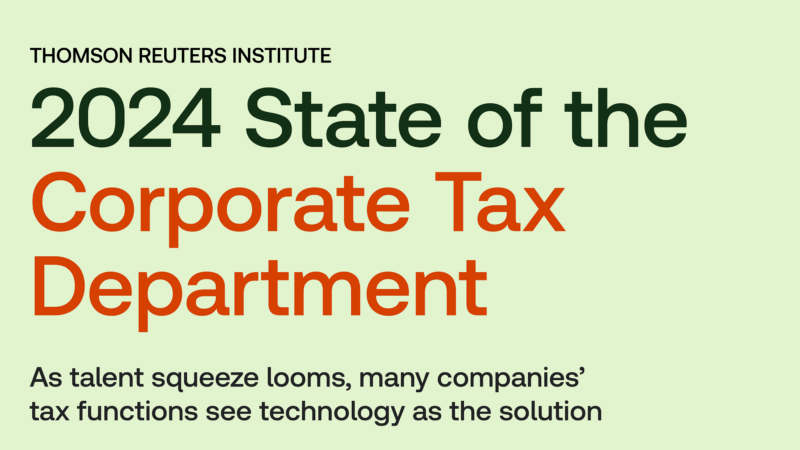Nov 15, 2024 | AI
Using Automation and AI Tools to Empower Under-Resourced Tax Teams

Ray Grove, head of Corporate Tax and Trade, Thomson Reuters, highlights how automation and generative AI can boost efficiency and support growth for under-resourced tax teams.
In an era of rapid technological advancement, tax departments stand at a critical crossroads. Nearly 80% of tax teams have automated half or less of their work processes – signaling an industry that is ripe for disruption and would greatly benefit from integrating new technologies. These are among the findings of the 2024 State of Corporate Tax Department report, which found that many tax professionals believe their departments are ill-equipped to make technological improvements.
Another takeaway: two-thirds of respondents said their tax departments are reactive or chaotic in their approach to technology. This echoes what we heard from respondents in the 2024 Future of Professionals report about tax professionals’ frustration with their firms’ sluggish adoption of AI.
Tax departments’ top challenges
In addition to exploring tax teams’ technology adoption rates, the report examined the biggest challenges they’re facing. Respondents ranked hiring and retaining talent as their top concern.
Not surprisingly, tax professionals ranked compliance issues around three unrelated tax regulations – Pillar 2, the Global Minimum Tax, and Base Erosion and Profit Shifting (BEPS) 2.0 – as their second, third and fourth greatest challenges.
Also of note, 51% – up from 47% last year – said their internal tax department is under-resourced. This is noteworthy because companies with under-resourced tax teams are more vulnerable to audits and penalties.
The report showed that under-resourced departments had an average of $50,000 in penalties versus $20,000 for “about-right resourced” departments. Also, those working in under-resourced departments felt behind their better-resourced peers in minimizing liability as well as avoiding incurring penalties and tax audits.
New technologies can make a positive impact
On a positive note, about 50% expect their departments’ tech budget to increase, which may indicate companies’ willingness to modernize their tax functions. In addition, the report found that more tax departments within smaller businesses – those with under $50M in annual revenue – are spending a larger portion of their budget – 25% and up – on technology.
These findings are encouraging because automating work processes can help improve efficiencies, which is a win-win: it helps tax departments address the talent crisis they’re facing while strengthening productivity. An added bonus is that this automation would enable tax professionals to spend more time on strategic and proactive tasks that could benefit the company.
The report showed that tax professionals, on average, spend 61% of their work time on tactical rather than strategic tasks, such as providing strategic advice or managing projects that add value to the company’s bottom line. New technologies and AI tools – such as Checkpoint Edge with CoCounsel, which allows users to conduct faster tax research – empower tax professionals to spend less time on reactive tasks and dedicate more time to proactive, forward-looking work.
For more insights on how embracing new technologies enables tax departments to be more valued partners to the business, download the full report.
This is a guest post from Ray Grove, head of Corporate Tax and Trade, Thomson Reuters.


